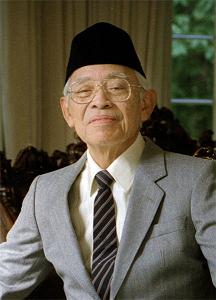Muhammad Subuh Sumohadiwidjojo
This article has multiple issues. Please help improve it or discuss these issues on the talk page. (Learn how and when to remove these template messages)
|
Muhammad Subuh Sumohadiwidjojo | |
|---|---|
 | |
| Born | Muhammad Subuh Sumohadiwidjojo June 22, 1901 Kedungjati, Dutch East Indies |
| Died | June 23, 1987 (aged 86) |
| Nationality | Indonesian |
| Other names | Pak Subuh, Bapak |
| Occupation | Spiritual leader |
| Years active | 1930s-1987 |
| Known for | Subud |
| Part of a series on |
| Subud |
|---|
| People |
| Main practice |
| Institutions |
| Affiliates |
| Special places |
| Related topics |
Muhammad Subuh Sumohadiwidjojo (born June 22, 1901, in Kedungjati, near Semarang, Java, Dutch East Indies; died June 23, 1987) was an Indonesian who founded the movement known as Subud.[1] As a young man Muhammad Subuh claims to have received a series of intense experiences that he believed gave him contact with a spiritual energy from a higher power. By the 1930s, he believed that it was his task to transmit this energy - which he called latihan kejiwaan (Indonesian for "spiritual exercise") - to others, but that he was not to seek people out but simply to wait for those who asked for it.
In 1956, Pak Subuh, or "Bapak" as he was called by members of Subud (the word "Bapak" is Indonesian for something akin to father), was invited to England by J. G. Bennett, where many Westerners joined Subud. He was then asked to go to other countries such as the United States and Australia. In this way, Subud spread rapidly around the world.
When he died in 1987 he left many talks on tape, video and in print, which Subud uses to guide the organization he founded.
Biography[edit]
Muhammad Subuh was an Indonesian monk who founded the Subud movement. "Subud" is a contraction of three Sanskit words: sushila, budhi, and dharma.[2] Subud centres around the mystical phenomenon of latihan.[2]
Muhammad Subuh wrote in his autobiography that, about the year 1932, he had a visionary visit to the highest heaven, the "Seventh Heaven". By his account, one night he felt drowsy and went to lie down in bed. Instead of falling asleep, he felt himself "lengthen, widen and expand into a sphere" and then entered a great space. He saw a group of stars far away and was told that it was the universe he had left behind. He then traveled at great speed through a great expanse and beyond, there were seven (7) "mountain-like cones of light, one stacked upon another". He described how he entered the cones of light one after another until he entered the seventh, the last. Then he returned to earth and saw what looked like stars in the sky but later realized they were the lights of Semarang, the hometown where he lived. He even tarried a little over the rooftop of his own house trying to lift up some roof tiles with his fingers but instead found himself inside his own room. It was about the time of Subuh or dawn.
In his description Muhammad Subuh implied the seventh cone of light represents the highest heaven. It is likely because of this description of his ascension that Muhammad Subuh insisted that his autobiography be published only after his death though it was completed much earlier.
From his first visit to Britain in 1957 until his death 30 years later in 1987, Muhammad Subuh is estimated to have travelled 594,320 miles outside Indonesia, visiting Subud groups around the world.[3] On these trips he gave explanations about the nature of the Latihan spiritual exercise and the purpose and meaning of the spiritual association of Subud. Approximately 1,400 of these talks were recorded,[4] with provisional translations to English made available at the time. These talks are currently being re-translated and republished by Subud Publications International. There are now Subud groups in over 70 countries, with a worldwide membership of about 10,000.
In the late 1950s, British academic John G. Bennett came under Pak Subuh's influence and funded his career, believing Pak Subuh to be a messiah.[2] By 1960, once interest in Subud had faded, Bennett had left Subud and became a Catholic.[2] The actress Eva Bartok was also a supporter of Pak Subuh.[2]
In Indonesia itself, very little literature is available on Subuh, and therefore very few people have knowledge about Subuh or the movement he founded.
Works[edit]
- Sumohadiwidjojo, Muhammad-Subuh (1990). Autobiography: The History of Bapak R.M.Muhammad Subuh Sumohadiwidjojo, Founder of the Spiritual Association of Susila Budhi Dharma, or Subud. Subud Publications International. ISBN 1-869822-07-2.
- Sumohadiwidjojo, Muhammad-Subuh (1993). Bapak's Talks, Volume 1. Subud Publications International.
References[edit]
- ^ "Subud", by Gisella Webb, in America's Alternative Religions, Timothy Miller, ed. (SUNY Press, 1995) p272
- ^ a b c d e Randi, James (1995). An encyclopedia of claims, frauds, and hoaxes of the occult and supernatural: decidedly sceptical definitions of alternative realities. New York, NY: St. Martin's Griffin. ISBN 978-0-312-15119-5.
- ^ Brochure, "Bapak's Extraordinary Journey" (SPI 2007)
- ^ Bapak's Talks, Volume 1 (SPI 1993), Publisher's Introduction
External links[edit]
- Subud Publications International Organisation dedicated to translating and publishing talks by Muhammad Subuh Sumohadiwidjojo
Subud International Brotherhood
Views 2,542,147Updated
At the heart of the movement is latihan (or latihan kejiwaan), an Indonesian term meaning ‘training’ or ‘exercise’. Latihan cannot be taught or acquired through imitation; it is said to arise spontaneously from within the individual after contact has been transmitted.
This movement, with members in some seventy countries, is responsible for many large enterprises, including banks and schools.
===

























